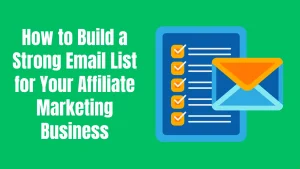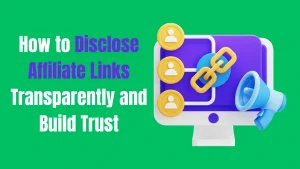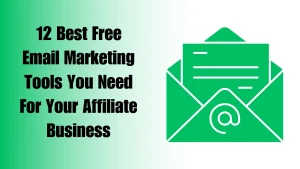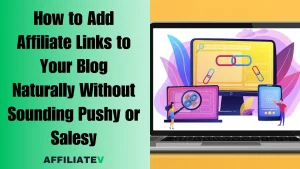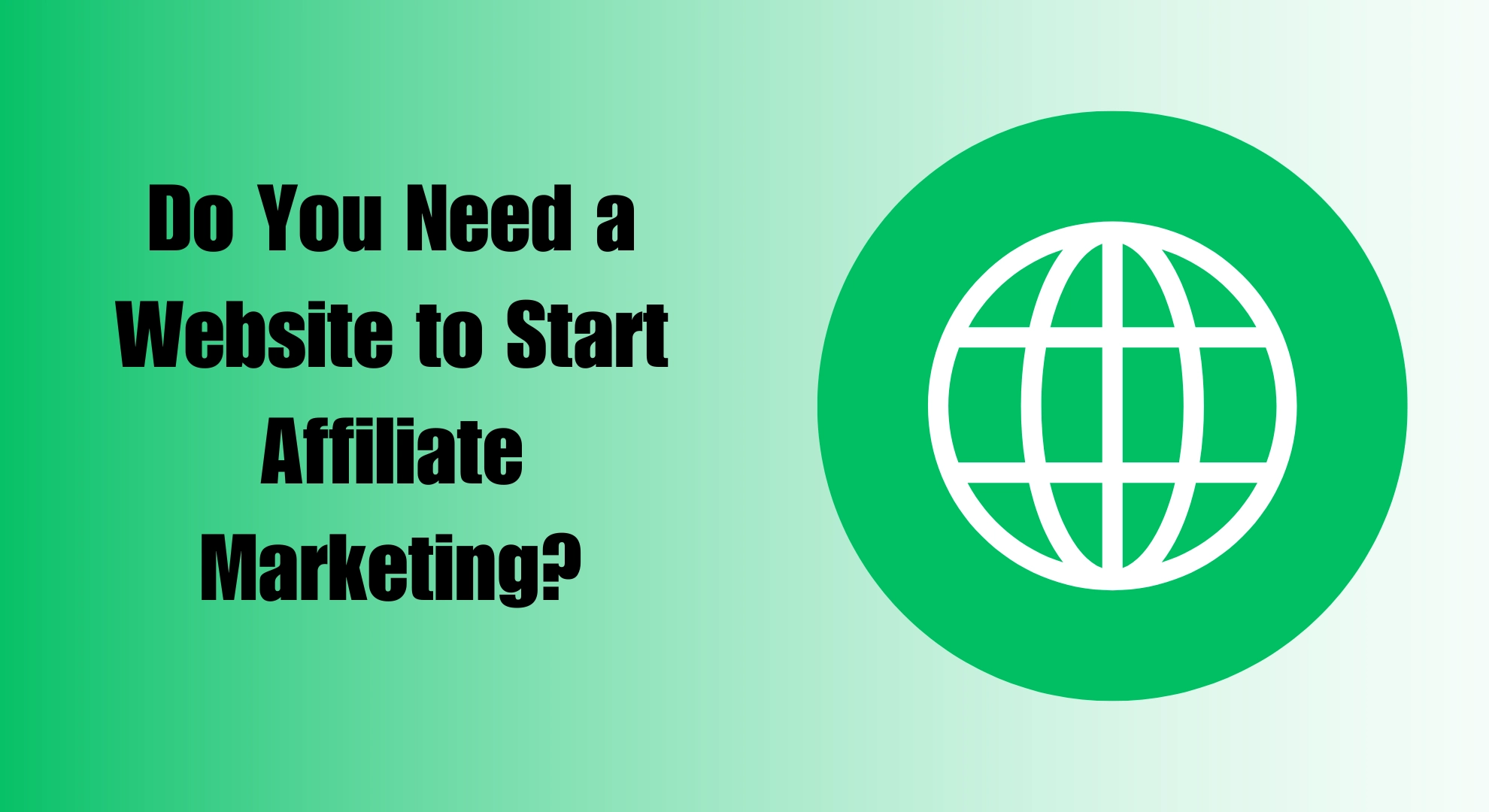
The answer is NO, you don’t need a website to start affiliate marketing. A lot of people assume that a website is the only way to do affiliate marketing. That’s not true.
While having one helps, plenty of affiliates make money without ever building a site. The key is knowing your options, understanding the pros and cons, and choosing what works best for you.
Affiliate marketing is simple. You promote products and earn a commission when someone buys through your link. A website is one way to do this, but social media, YouTube, and email marketing work too. Some top affiliates don’t even own a website.
In this article, I’ll break down the alternative methods of doing affiliate marketing without actually owning a website. We’ll also discuss the pros and cons of using a website for your affiliate business.
You’ll learn different ways to succeed and how to choose the best approach for you.
Key Takeaways
- You don’t need a website to start affiliate marketing, but it can make things easier.
- Affiliate marketing works by promoting other people’s products and earning commissions from sales.
- Social media, YouTube, and email marketing are all great ways to do affiliate marketing without a website.
- A website offers control, brand credibility, and the ability to drive organic traffic with SEO.
- If you’re aiming for long-term growth and passive income, building a website is worth considering.
- Affiliate marketing can be done without a website, but having one adds stability and sustainability to your business.
What is Affiliate Marketing?
Affiliate marketing is all about promoting products made by others and earning a commission when someone buys through your link. It’s simple, really. You don’t need to create your own product, just share something that fits your audience and get paid when it sells.
In this process, there are three key players. First, there’s the merchant — they’re the ones who create or sell the product. Then, you have the affiliate, which could be you, who promotes the product to your audience. And lastly, the customer is the person who clicks your link and buys the product.
Some of the most popular affiliate programs out there include Amazon Associates, ClickBank, and ShareASale. Amazon offers everything from gadgets to books, ClickBank has lots of digital products, and ShareASale connects you to thousands of different companies and brands.
These platforms make it easy for anyone to start promoting and earning commissions.
Must Read: 15 Best Affiliate Networks That Actually Pay: (My Personal Picks After Years in the Game)
Want to learn exactly how to start affiliate marketing the right way?—without all the confusion?—join my free 14-day email course. I’ll walk you through everything step by step, from choosing the best programs to making your first commission. Sign up now and get started!
Do You Need a Website for Affiliate Marketing?
Many people thinks that you need a website to start affiliate marketing, but that’s not the case. From my experience, you can dive right in without one.
You can promote affiliate products on social media, YouTube, or even through email marketing. It’s all about sharing your affiliate links with the right people and driving traffic.
That being said, having a website does have some serious perks. When you have your own website, you have more control over the content you create, and it can help you build your brand and authority. Plus, SEO can work in your favor, helping you draw organic traffic over time.
I’ve personally seen how much a website can make a big difference when it comes to creating a long-term asset for your affiliate business.
But don’t worry, if a website isn’t for you, there are plenty of ways to succeed without one. You can focus on platforms like Instagram, Facebook, or TikTok, and still make affiliate sales.
Or you can create engaging video content on YouTube or run targeted ads through Google and Facebook. There’s no one-size-fits-all, and sometimes skipping the website is exactly the route you need to take.
Advantages of Having a Website for Affiliate Marketing
A website isn’t required to do affiliate marketing, but it gives you a serious advantage. It helps you build trust, attract free traffic, and create a long-term business that isn’t tied to social media rules. Let’s break down why having a website makes a difference.
1. Brand Authority & Credibility
A website makes you look professional. When people search for product recommendations, they’re more likely to trust a well-written blog over a random social media post.
A website gives you a home base—somewhere people can visit, read your content, and see that you know what you’re talking about.
Let’s assume you were buying a product, would you trust a detailed review on a well-organized site or a quick Facebook post with a link? A website builds your reputation. Over time, people recognize your brand and return for more advice, which leads to consistent affiliate sales.
2. SEO Benefits: Free Traffic from Search Engines
One of the biggest perks of having a website is search engine traffic. Instead of constantly posting on social media or paying for ads, you can get visitors from Google—without spending a dime.
Helpful, well-optimized content can help your site rank for keywords people search for.. For example, if you review “best email marketing tools,” someone searching for that term might find your site, read your post, and click your affiliate link. That means passive income, even while you sleep.
SEO takes time, but once your site ranks, you can get steady traffic without doing extra work. Social media posts disappear in hours, but a blog post can bring visitors for years.
3. Content Ownership & Control
Relying on third-party platforms is risky. Social media accounts can be banned, algorithms change, and policies shift overnight. If you depend on YouTube, Instagram, or TikTok, you’re at the mercy of those platforms.
With a website, you own everything. No one can shut it down because of a rule change. You decide how your content looks, what you promote, and how you make money. You’re not competing with an algorithm that decides how many people see your posts.
This also means you can build an email list, which is one of the most valuable assets in affiliate marketing. With an email list, you can send promotions directly to your audience instead of hoping they see your content on social media.
I recommend using GetResponse to set up automated emails and grow your list effortlessly.
4. Long-Term Sustainability: A Business That Lasts
Affiliate marketing is always not about quick wins—it’s about long-term growth. A website gives you a stable foundation that lasts for years. Unlike social media, where content fades fast, blog posts stay relevant and continue bringing in traffic.
As your site grows, so does your earning potential. You can scale by adding more content, covering new topics, and building relationships with brands. If you ever want to expand, you can offer digital products, courses, or memberships—all from your website.
A website makes affiliate marketing easier, but it’s not the only way. If you’re comfortable with social media, video content, or email marketing, you can start without one. The best approach depends on your skills, audience, and preferences.
For a long-term success, consider building a website eventually. It gives you control, credibility, and a solid foundation for growing your income.
Alternative Ways to Do Affiliate Marketing Without a Website
You don’t need a website to be successful in affiliate marketing. There are several ways to promote affiliate products and earn commissions. Here’s how you can get started without the hassle of managing a website.
1. Social Media Marketing: Instagram, Facebook, Twitter, and TikTok
Social media platforms are powerful tools for affiliate marketing. You can share affiliate links directly in your posts, stories, or bios. Instagram, Facebook, Twitter, and TikTok offer huge audiences, making them great for building relationships and promoting products.
If you already have a following, this is an easy way to get started. Just remember to focus on engaging with your audience and provide value before you ask them to click your affiliate links.
2. YouTube Affiliate Marketing
YouTube is another platform where you can share affiliate products through video content. By creating helpful or entertaining videos, you can naturally weave in affiliate links in the video description.
This works well if you’re comfortable on camera and have a good content strategy. Whether it’s product reviews, tutorials, or unboxings, your audience will click on your affiliate links if they find the content useful.
3. Email Marketing
Building an email list is one of the best ways to do affiliate marketing without a website. You can collect email addresses by offering freebies or valuable content in exchange for their details.
You can use landing pages or lead magnets (like free guides) to collect emails and promote products through newsletters.
Once you have a list, send regular emails that provide value and include affiliate offers. The key here is to nurture relationships with your subscribers and offer them only relevant products that align with their interests.
Here are 12 Best Free Email Marketing Tools You Need For Your Affiliate Business
4. Paid Ads (PPC Campaigns)
Paid ads are another option to promote affiliate products. With platforms like Google Ads or Facebook Ads, you can target specific audiences with your affiliate offers.
However, you’ll need to set up landing pages (you don’t need a full website for this) to convert the visitors into buyers. Paid ads require a budget, but when done correctly, they can generate consistent affiliate commissions.
5. Forums & Communities: Reddit, Quora, and Niche Forums
Engaging in forums and online communities can be a great way to promote affiliate products without a website.
Platforms like Reddit and Quora allow you to join discussions, answer questions, and naturally drop affiliate links where relevant.
Additionally, niche forums related to your affiliate products provide a targeted audience. Just ensure you’re providing value first, not just spamming links.
Each of these methods gives you flexibility and allows you to build affiliate marketing success without a website. Choose the strategy that best fits your strengths and interests.
Pros & Cons of Website vs. No Website
When considering affiliate marketing, the choice between having a website or not can significantly affect your strategy. Let’s break down the pros and cons of both options to help you make an informed decision.
| Aspect | With a Website | Without a Website |
|---|---|---|
| Control | You have full control over content, design, and traffic. | Limited control over content and platform policies. |
| SEO & Organic Traffic | Can rank in search engines, bringing long-term traffic. | No SEO benefits; relies on social platforms or ads. |
| Brand Authority | Strong brand presence builds trust and recognition. | Less control over branding, mainly through platforms. |
| Scalability | Easier to scale; you own the platform. | Harder to scale; dependent on third-party platforms. |
| Monetization | More ways to monetize (ads, product sales, etc.). | Limited monetization options without a website. |
| Flexibility | High; you can change anything anytime. | Limited flexibility due to platform restrictions. |
| Upfront Investment | Requires upfront investment (domain, hosting, etc.). | No upfront costs, but may require paid ads or tools. |
| Passive Income | Potential for steady passive income with SEO. | Harder to generate passive income consistently. |
| Maintenance | Requires ongoing updates and upkeep. | Low maintenance; mostly passive once set up. |
| Long-Term Sustainability | A stable digital asset that can last for years. | Less sustainable long-term; reliant on third-party platforms. |
When Should You Consider Building a Website?
As I mentioned before, building a website is not always necessary, but there are specific scenarios where it can greatly benefit your affiliate marketing business. Here are some key reasons to consider creating one.
- If you want long-term passive income: A website offers the opportunity for consistent traffic and income, especially with SEO. If you want to grow an asset that works for you over time, a website is the right choice.
- If you prefer organic traffic (SEO): If you want to rank in search engines and attract visitors without paid ads, a website is essential. It lets you optimize for SEO, driving free, long-term traffic.
- If you want to establish a strong brand presence: With a website, you control your brand’s image, design, and messaging. It’s much easier to build credibility and trust when you own the platform.
If you’re looking for a more independent, sustainable approach to affiliate marketing, building a website is the way to go.
Conclusion
After diving deep into this topic, the answer is clear: No, you don’t need a website to start affiliate marketing. You can absolutely succeed by leveraging platforms like social media, YouTube, and email marketing to promote affiliate products. These methods allow you to get started quickly without worrying about building and maintaining a website.
However, having a website does offer distinct advantages. It provides more control over your content and allows you to create a stronger, long-term brand presence. Websites also provide SEO benefits and the potential to build passive traffic over time. If you’re serious about long-term growth, a website can be a stable asset for your affiliate marketing efforts.
Ultimately, whether to build a website depends on your goals and preferences. If you’re looking for immediate results with lower investment, using social media or other alternatives can be a great way to start. If you want to build a lasting, credible brand and attract organic traffic, a website can offer those long-term benefits.
Choose the path that aligns best with your strategy, and don’t forget to take action—regardless of the method you choose, success comes through consistent effort.
Frequently Asked Question
Can I do affiliate marketing without a website?
Yes, you can absolutely start affiliate marketing without a website. Many affiliate marketers successfully use social media platforms like Instagram, Facebook, and TikTok to promote affiliate products. You can also use YouTube to create content and share affiliate links in the video descriptions, or even build an email list to promote offers. It’s all about creating valuable content and engaging with your audience on platforms that don’t require you to have a website.
What are the benefits of having a website for affiliate marketing?
Having a website for affiliate marketing offers several advantages. It gives you complete control over your content, allowing you to structure your affiliate marketing efforts the way you want. Websites also help build trust with your audience, as people are more likely to trust a professional-looking website over social media profiles. Additionally, SEO (search engine optimization) can drive organic traffic to your site over time, helping you build a long-term, sustainable affiliate income.
What platforms can I use to promote affiliate products without a website?
There are many platforms you can use to promote affiliate products without needing a website. Social media sites like Instagram, Facebook, TikTok, and Twitter let you share affiliate links directly in posts or stories. YouTube is another powerful platform where you can create videos, include affiliate links in the description, and monetize your channel. Email marketing is also effective, where you build an email list and send affiliate offers to subscribers. Additionally, engaging in niche forums like Reddit or Quora can help you share affiliate links in discussions without a website.
Is it harder to succeed in affiliate marketing without a website?
It can be a bit more challenging, but it’s not impossible. Without a website, you’re more dependent on third-party platforms like social media or YouTube. The success of your affiliate marketing efforts depends on how well you can engage with your audience and create content that adds value. The key is consistency and understanding your audience’s needs, and with the right strategy, you can still be successful without a website.
How long does it take to see results from affiliate marketing without a website?
The timeline to see results can vary, but it typically takes a few weeks to a couple of months. It depends on how much effort you put into creating valuable content, building an audience, and promoting affiliate products. If you focus on growing your social media presence or YouTube channel, you might start seeing some results in a few months, but affiliate marketing is often a long-term game, so patience and consistency are key.
Should I start affiliate marketing with a website or without one?
It depends on your goals. If you’re looking to get started quickly and without much setup, starting with social media or YouTube might be the way to go. However, if you want to build something that can generate passive income over time, a website might be a better option. Websites provide more control, long-term growth opportunities, and can help with SEO. Ultimately, it’s up to your personal preferences and what you feel comfortable with. You could even combine both methods—using social media to promote affiliate products while also building a website for the long term.

